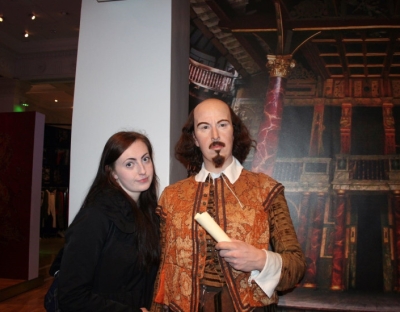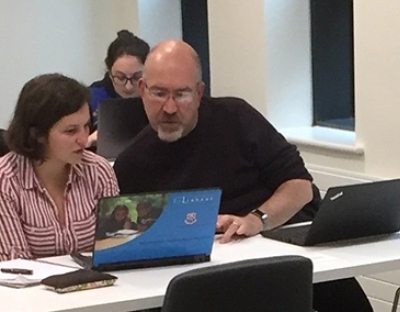By Shaunagh-Marie O'Reilly, 4th year BA in English and History student at University of Limerick
The Final Year Project or FYP is the beginning of the end of your journey as an undergraduate, which gives the project a bitter-sweet feeling as you prepare to submit your work.Realistically, if you enjoy working on your FYP and learn new and interesting things from your research, you’re doing it right! This has been the most rewarding part of my project by far.Throughout my four years at UL, the number of essays I have had to submit nears 70; for all of which the topics have been prescribed, and there’s been a certain expectation attached to each one. Attendance for lectures and tutorials, as well as plenty of reading is essential for a good grade in these modules, which is what makes the FYP both an exciting and stressful experience.You get to choose your topic. You get to choose your title. And you get to choose your focus.While this may be a dream come true for some students (myself included), others may feel daunted by the fact that they have to assign an extended essay title to themselves, carry out their own research and create their own thesis.I think that most students see the 9,000 word minimum limit and worry about how they’re going to reach that target (I certainly did).
The majority of essays that I have completed as part of my degree have varied between 1,500 and 3,500 words, though I write essays for both the English and History departments.I found myself thinking that I needed to make my project much longer than I had wanted, and contacted several potential supervisors with the topic of researching the written word. “The History of the Book” was my first official title, to which my (then potential) supervisor replied with “This is too long – you need to find something a little more specific”.So I chose Shakespeare. I loved reading his tragedy Romeo and Juliet for my Junior Certificate (back in 2012), and later Othello for my Leaving Certificate (2015). But I never had the opportunity outside of these two instances to read more of his works, which made me feel like a fake fan.I decided that I wanted to look back at the two plays that piqued my interest all those years ago with fresh eyes and my own opinions, as well as study another tragedy that I was eager to read: Hamlet. However, my project expanded to incorporate modern adaptations, as well as the sources Shakespeare is thought to have used in the creation of his works, totalling nine primary documents to be analysed by the end of my research.
My research was slow at first; I focused on the FYP chapter-by-chapter, beginning with Romeo and Juliet (c.1597) as I felt that I knew that play the best of the three. I had also previously seen the film starring Leonardo DiCaprio and felt confident that I already knew my argument before I had even begun writing. That first chapter finished at 4,000 words.Remember how I said that I was concerned about the impossible word count of 9,000 words at the beginning of this post? Neither do I.I think I’m most proud of my use of primary sources for this project, in particular the older text I analysed. The tragedy of Hamlet (c.1603) is based on Amleth Prince of Denmark, a legend recorded by Saxo Grammaticus around 1205AD. His work not only details the story of the Danish Prince, but the rest of his collection (Called the ‘Gesta Danorum’) recalls several legends, and warns the reader of various events (such as the promiscuity of women in Amleth’s tale).The story, although translated, is quite dense to read. One might even call a lot of it waffle – Grammaticus liked to thoroughly describe exactly what is happening in the story. There is a spy that is boiled and fed to pigs, Amleth marries two women consecutively, and the moral to be learned is that women are unfaithful and lust after men incontinently. It is an interesting story to read, although you might want to set aside a few hours if you want to read it completely.
Finishing the FYP is a bitter-sweet moment, for sure. You go to the library and spend hours poring over a document; looking over primary and secondary sources; typing out 100 words and erasing 80 because you weren’t happy with your progress, for nearly a year. And then you receive your final email from your supervisor, you print it out and bind it… it all seems a little surreal.Your four years of hard work is represented by a meagre 12,000 words, bound in coloured card and plastic. It feels a little anti-climactic.
That isn’t to say that the experience isn’t worth it, because it most definitely is. Being able to discuss Shakespeare with my supervisor and other students who focused on him was an amazing experience for me, because for years I didn’t express my admiration of his works out of fear of not knowing enough. I have learned so much about the Early Modern Period (1450-1750, basically Shakespeare’s timeline) and shaped so many new opinions or admirations for him through studying his works. I have become more confident in my ability to research a topic and compile the information in a coherent manner, and being able to relay this information to both people who know Shakespeare, and those that don’t.
If I could give any advice on completing your FYP, it would be to start early. I don’t mean to have a full draft ready before your final year begins, especially if you work full-time during the summer months.Check out books. Find articles. Read the newspaper. Watch documentaries. Take it one step at a time, and record any information that could help you in your research. Don’t put it all off until you return to campus in September, and don’t overwork yourself. Take it in small bite-sized chunks and have fun with it, and I’ll guarantee you’ll have a 4,000 word first chapter draft by August.
Thursday of Week 6 2019 is FYP deadline day for all AHSS students. Let us celebrate with you, by tagging a photo of yourself submitting your FYP with #FYPDAY2019



